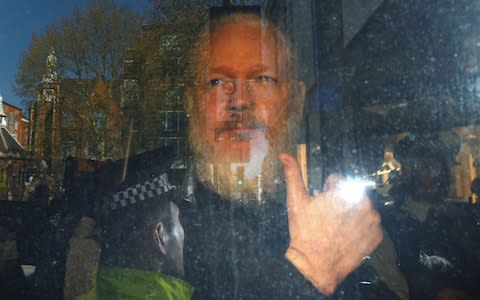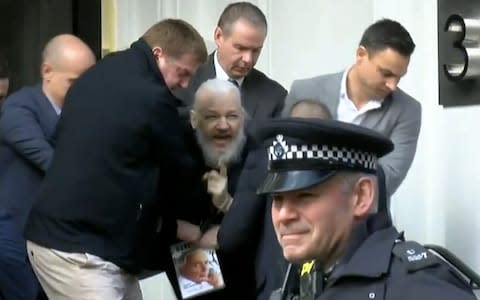Julian Assange charged by US for computer-related offences after being forcibly removed by British police from Ecuadorian embassy

Julian Assange has been charged by the US for computer-related offences after he was arrested by the Metropolitan Police earlier today. He has now been found guilty in a UK court for skipping bail.
The Wikileaks founder faces possible extradition to the US after being expelled from the Ecuadorean Embassy, where he was hiding as a fugitive for seven years.
The Metropolitan Police confirmed the 47-year-old was arrested in response to an extradition warrant by the US, as well as for his bail offences in the UK.
Judge Michael Snow at Westminster Magistrates Court found Assange guilty of failing to surrender, calling him a "narcissist" and suggesting his representations in court have been "shameful" and that the claim he has not had a fair hearing was "laughable".
He has sent Assange for sentencing at the Crown Court, and if guilty he faces a jail sentence of up to 12 months. He will next appear in court on the 2nd of May by video link on the extradition matter. He will next appear on the bail offence at Southwark Crown Court on a date to be announced.
The US department of justice confirmed he has been charged with computer crimes, and added in a statement that if convicted he will face up to five years in prison.
The statement revealed criminal charges against Mr Assange linked to his role in the release of sensitive diplomatic cables in 2010.
Mr Assange was accused of helping Chelsea Manning, the ex-intelligence analyst in the US Army, to break a password to a classified US government computer.

Cracking the password would allow Manning to log on under a different username, according to US prosecutors, lowering the chance of getting caught.
Mr Assange is also accused of having actively encouraged Manning to leak more classified information.
He once wrote to Manning that "curious eyes never run dry in my experience" when told there was no more material left to reveal, according to the indictment.
US prosecutors said Mr Assange faces a maximum penalty of five years in prison and is considered innocent until proven guilty beyond reasonable doubt.
For the trial to be heard in America, Mr Assange will have to be extradited from Britain to the US - a move that his legal team will likely fight.
The existence of an indictment against Mr Assange had accidentally been revealed in an unrelated court filing in November 2017.
In a statement, the Home Office said: "We can confirm that Julian Assange was arrested in relation to a provisional extradition request from the United States of America.
"He is accused in the United States of America computer related offences."

Assange was stripped of his Ecuadorian citizenship and asylum status and removed from the Embassy earlier on Thursday morning.
The court heard the Ecuadorian ambassador called Scotland Yard on Thursday morning and said they would be withdrawing political asylum. Officers arrived at around 9.15am. Shortly after 10am, tried to introduce themselves to Assange but he barged past them and tried to hide in his room. He then resisted arrest while shouting: "This is unlawful."
Ecuador's president Lenin Moreno said Assange had been "discourteous and aggressive" during his stay and added that he had broken multiple conditions of his asylum.
He said: "He particularly violated the norm of not intervening in the internal affairs of other states.
"The most recent incident occurred in January 2019, when WikiLeaks leaked Vatican documents. Key members of that organisation visited Mr Assange before and after such illegal acts."
He also claimed Assange had installed "distortion equipment" in the embassy, and that he had "mistreated guards".
Finally, he said, two days ago the 47-year-old "threatened Ecuador" through Wikileaks.
The Wikileaks founder was wanted by the UK police for breaching his bail conditions, after a saga that began in November 2010, when Sweden issued an international arrest warrant for Assange, after authorities in the country questioned him over allegations of sexual assault and rape, which he denied.
He claimed he would be extradited from Sweden to the US because of his role in publishing hundreds of thousands of US diplomatic cables.
The hacker surrendered to British police in 2012 and was released on bail within 10 days, but breached his bail conditions after an unsuccessful appeal against extradition to Sweden.
He was then granted asylum by Ecuador and allowed to remain in the embassy.
Nearly 7yrs after entering the Ecuadorean Embassy, I can confirm Julian Assange is now in police custody and rightly facing justice in the UK. I would like to thank Ecuador for its cooperation & @metpoliceuk for its professionalism. No one is above the law
— Sajid Javid (@sajidjavid) April 11, 2019
The Wikileaks Twitter account posted: "Ecuador has illigally [sic] terminated Assange political asylum in violation of international law." One of his lawyers, Jen Robinson, tweeted her fears that he would be extradited to the US.
His friend, Baywatch star Pamela Anderson, posted on Twitter that she was worried about his health. She wrote: "He looks very bad." She said of those who arrested him: "You are devils and liars and thieves. And you will rot".
The whistleblower and fugitive Edward Snowden added: "Assange's critics may cheer, but this is a dark moment for press freedom."
Foreign secretary Jeremy Hunt said President Moreno made a "courageous decision", adding: "it's not so much that Julian Assange was being held hostage in the Ecuadorian Embassy, it was actually Julian Assange holding the Ecuadorian Embassy hostage.
"It was a situation that was absolutely intolerable to them."
Julian Assange is no hero and no one is above the law. He has hidden from the truth for years. Thank you Ecuador and President @Lenin Moreno for your cooperation with @foreignoffice to ensure Assange faces justice
— Jeremy Hunt (@Jeremy_Hunt) April 11, 2019
Home Secretary Sajid Javid tweeted: "Nearly 7yrs after entering the Ecuadorean Embassy, I can confirm Julian Assange is now in police custody and rightly facing justice in the UK.
"I would like to thank Ecuador for its cooperation & @metpoliceuk for its professionalism. No one is above the law".
Minister of State for Europe and the Americas, Sir Alan Duncan, added: “It is absolutely right that Assange will face justice in the proper way in the UK. It is for the courts to decide what happens next.
“We are very grateful to the Government of Ecuador under President Moreno for the action they have taken.
“Today’s events follow extensive dialogue between our two countries.
“I look forward to a strong bilateral relationship between the UK and Ecuador in the years ahead.”
Sweden's Chief Prosecutor Ingrid Isgren said: "This is news to us too, so we have not been able to take a position on the information that is now available. We also do not know why he is under arrest. We are following the developments."
The Swedish authorities dropped their investigations into sex allegations against Mr Assange, which he had always denied.
However, the Swedish woman made the allegations has welcomed his arrest.
Elisabeth Massi Fritz, who represents the unnamed woman, said news of Assange's arrest was "a shock to my client" and something "we have been waiting and hoping for since 2012".
Ms Massi Fritz said in a text message sent to the Associated Press that "we are going to do everything" to have the Swedish case reopened "so Assange can be extradited to Sweden and prosecuted".

